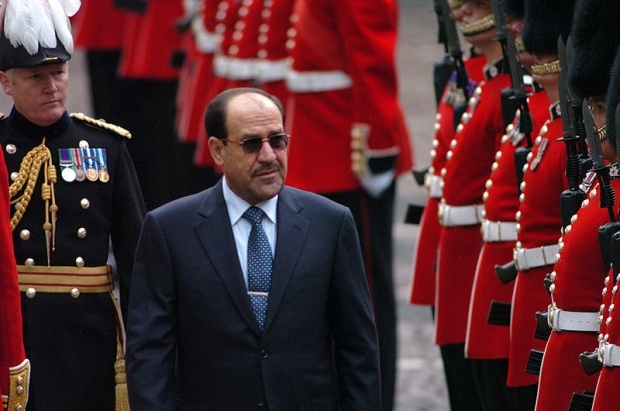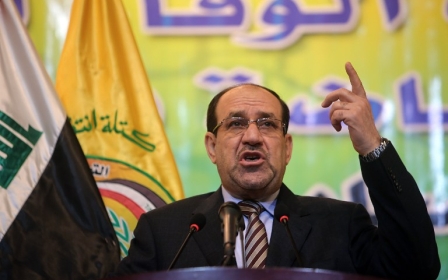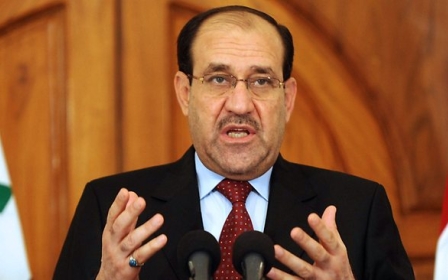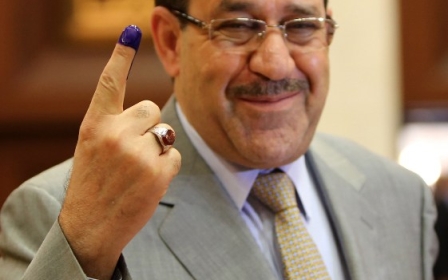Nuri al-Maliki, Iraq's rebel-turned-PM

By Prashant Rao
BAGHDAD - Nuri al-Maliki, Iraq's tough-talking but uncharismatic rebel-turned-leader, looked set to remain prime minister after results on Monday from April's general election put his party in the lead.
Maliki's State of Law alliance won 92 out of 328 seats in parliament, with other blocs tallying between 19 and 29 seats, meaning he will need his rivals' support in order to keep the top job.
The news highlights the latest change in the script for the 63-year-old Shiite Arab, who was regarded as a weak compromise candidate when he emerged from the shadows in 2006 to become premier.
He has since undergone several transformations, from a nationalist who battled militias within his own Shiite community and brought violence under control, to being accused of amassing power and sidelining partners.
New MEE newsletter: Jerusalem Dispatch
Sign up to get the latest insights and analysis on Israel-Palestine, alongside Turkey Unpacked and other MEE newsletters
Throughout, he has been seen as a rarity agreeable to both the United States, Iraq's former occupier, and Iran, its powerful Shiite-majority neighbour.
Former US president George W. Bush has called Maliki "a good man with a difficult job", and Maliki himself has said he is "a friend of the United States, but... not America's man in Iraq".
Maliki's past eight years were markedly different from his life before the 2003 US-led invasion.
Born Nuri Kamal al-Maliki in a predominantly Shiite town south of Baghdad, he joined the Islamic Dawa party - the oldest Iraqi movement opposed to Saddam Hussein - while at university.
He fled in 1979 after the dictator banned the party, and Dawa says he was later sentenced to death in absentia.
From 1980, he lived in Iran and then Syria, where he edited Dawa's newspaper. In exile, he adopted the nom de guerre Jawad and coordinated cross-border raids from Iran into Iraq.
He returned after Saddam's ouster in 2003, and became a member of the de-Baathification commission that barred Saddam supporters from public office.
Thrust to power
In 2006, the dour, bespectacled politician was named premier after his predecessor Ibrahim al-Jaafari, also a Shiite, was regarded as too sectarian by Sunnis and Kurds.
Thrust to power at the height of Iraq's brutal sectarian war that killed thousands of people each month, Maliki was seen then as politically weak.
But he stayed in office and in 2008, with US army backing, faced down accusations of sectarianism and pursued an offensive against the militia of powerful Shiite cleric Moqtada al-Sadr.
The successful assault won him plaudits across the communal spectrum, and he staked his reputation as a nationalist leader who had brought Iraq's raging violence under some semblance of control.
Under Maliki, American forces withdrew in late 2011 and oil production has steadily increased.
Since being re-elected premier in 2010 at the head of a national unity government, Maliki has faced near-constant political crisis and narrowly survived an attempted vote of no confidence.
His critics accuse him of consolidating power, particularly within the security forces, and blame him for a year-long deterioration in security, rampant corruption and poor basic services.
He faces strong opposition in the Sunni-dominated west and Kurdish north, with rivals there insisting they will not countenance a third term.
Maliki blames external factors such as the civil war in Syria for the surge in unrest - Iraq's worst since his 2008 offensive on Sadr - and says his so-called partners in government snipe at him publicly and block his legislative efforts.
But he still has the firm backing of his Shiite-majority heartland in southern Iraq, and with a hefty number of parliamentary seats, will be hard to dislodge.
Middle East Eye delivers independent and unrivalled coverage and analysis of the Middle East, North Africa and beyond. To learn more about republishing this content and the associated fees, please fill out this form. More about MEE can be found here.




